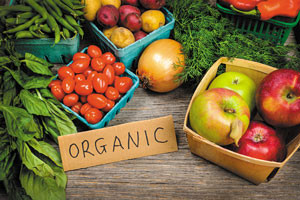People often ask about the difference between organic vs non-organic nutrition benefits. Is organic food really healthier? Does non-organic produce harm your body? This debate grows as more shoppers seek clean eating, pesticide-free choices, and better nutrition. Knowing what each offers helps you decide where to invest your food budget. Let’s break it down by quality, safety, health outcomes, and environmental impact—all in a simple, real-world way.

What Defines Organic and Non-Organic?
Organic food grows without synthetic pesticides, fertilizers, GMOs, or hormones. It uses natural farming methods that protect soil, water, and biodiversity. Non-organic food, on the other hand, relies on chemical inputs, faster yields, and conventional processing. In meat and dairy, organic farming avoids antibiotics and growth hormones.
Certifications like USDA Organic guarantee certain standards, but not all healthy foods must be organic. The organic label reflects how the food is grown, not its exact nutrient value. Still, organic choices often lead to cleaner, fresher eating with fewer additives and toxins.
Nutritional Differences: Are Organics Healthier?
Studies show organic fruits and organic vegetables often contain slightly more antioxidants, polyphenols, and vitamins. This happens because organic plants defend themselves naturally, boosting their nutrient density. You also avoid pesticide residues, which some say disrupt hormones and lower immune response.
Non-organic foods, however, still meet safety levels and offer good macronutrients like fiber, protein, and carbs. A non-organic apple still brings vitamin C—but possibly with more chemical residue. So, while the nutrition gap isn’t massive, the quality of nutrients in organic foods often proves more favorable.

Food Safety and Contaminants
Organic products reduce your exposure to toxic chemicals, heavy metals, and antibiotic-resistant bacteria. Children and pregnant women especially benefit from this cleaner diet. Organic meats avoid drug-treated feed, reducing antibiotic intake.
In contrast, non-organic food may carry pesticide traces, even after washing. Long-term exposure to these can lead to hormonal imbalance or gut microbiome disruption. Still, government rules monitor residue limits. But if you eat large quantities of non-organic produce, you may absorb more than your body handles well over time.
Washing, peeling, and cooking help reduce risks, but don’t remove them completely.
Environmental and Ethical Impact
Choosing organic food also supports sustainable farming, protecting soil health, water purity, and pollinators like bees. It limits the release of agricultural chemicals into the environment. Organic farming respects animal welfare, offering better living conditions and less stress on livestock.
Non-organic practices, while efficient, often damage ecosystems. Overuse of fertilizers and pesticides leads to soil depletion, water pollution, and even climate stress. So while nutrition may seem similar, your choice impacts the planet directly. Going organic helps create a greener food chain.

Price vs Value: Is Organic Worth It?
Yes, organic foods usually cost more. But you’re paying for better practices, not just produce. Fewer toxins, richer soil, and safer production raise the price tag. If budget matters, buy organic versions of the “Dirty Dozen” like strawberries, spinach, and apples—these retain the most chemicals when grown conventionally.
Stick to non-organic options for thick-skinned or low-risk foods like avocados, onions, or bananas. The key is balance. Invest where it counts. You don’t need a 100% organic pantry—just make smarter swaps over time.
Final Verdict: Personal Health or Preference?
There’s no one right answer in the organic vs non-organic nutrition benefits debate. Both offer nourishment. But organic food delivers added value in purity, ethics, and environmental care. If you can afford it, choose organic where exposure risks are high. If not, eat plenty of whole foods, regardless of label. Nutrition comes from consistency, not perfection. Trust your body, do your research, and enjoy the food that fuels you best.
